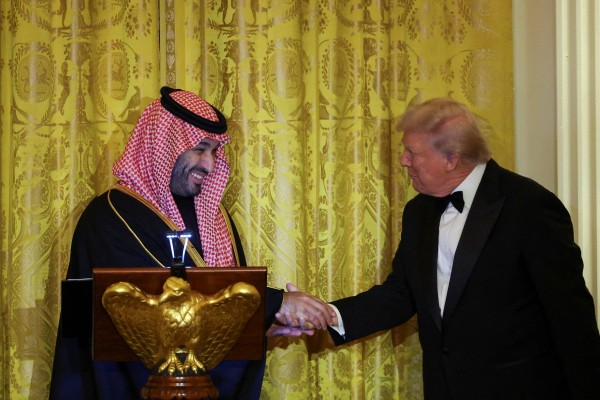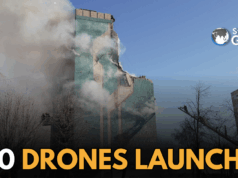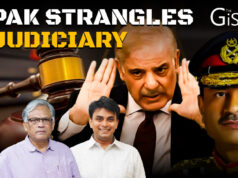
The United States has formally designated Saudi Arabia a Major Non-NATO Ally (MNNA), a significant upgrade in bilateral defence ties announced by President Donald Trump during Crown Prince Mohammed bin Salman’s visit to the White House on November 18.
Trump unveiled the designation at a dinner in honour of the Crown Prince. The MNNA status grants Riyadh a suite of defence-trade privileges. These include the sale of 48 F-35 jets, streamlined access to U.S. military technology, eligibility for joint research and development with the Pentagon, and the potential stationing of U.S. war-reserve materiel on Saudi soil. The two countries also signed a joint declaration on the completion of negotiations on civil nuclear energy cooperation.
The approval to sell the F-35 stealth fighter jets to Saudi Arabia is a major shift given earlier American reluctance to provide the platform to Gulf states. The Jerusalem Post said the deal could alter the military balance in the Middle East and test Washington’s definition of maintaining what the US has termed Israel’s “qualitative military edge”. Until now, Israel has been the only country in the Middle East to have the F-35.
This pact comes despite an earlier U.S. Defense Intelligence Agency report warning that China could acquire the F-35’s advanced technology given Beijing’s defence ties with Riyadh. China is now Saudi Arabia’s largest trading partner, and the two have also conducted several joint naval exercises in recent years.
Al Jazeera said a White House fact sheet confirmed the F-35 transfer and added that Riyadh would also buy around 300 U.S.-made tanks as part of a broader military package that extends to artificial intelligence cooperation, nuclear-energy collaboration and supply-chain integration on critical minerals. Al Jazeera also said the U.S. described the agreement as strengthening deterrence across the Middle East while reducing costs for Washington by securing new Saudi “burden-sharing” contributions.
Politico reported that Crown Prince Mohammed used the visit to signal a dramatic expansion in Saudi investment in the United States, pledging to raise it from roughly $600 billion to nearly $1 trillion. The outlet framed the pledge as part of a broader reset in U.S.–Saudi ties under Trump, who has sought to lock in the kingdom as a central pillar of his Middle East strategy.
Some reports said the designation is primarily a political and practical signal of strategic closeness: it does not create a mutual-defence guarantee or any automatic U.S. military obligation.
The National explained that the benefits of MNNA status are substantial but finite. U.S. officials quoted by the outlet stressed that MNNA “does not entail any security commitments.” Rather, it offers a formalised pathway for closer defence cooperation, expedition of military sales, and a more predictable framework for long-term technological and industrial collaboration.
ABC News reported that President Donald Trump defended Saudi Crown Prince Mohammed bin Salman during the royal’s first U.S. trip in seven years, calling his human-rights record “incredible” and dismissing questions about Jamal Khashoggi’s murder.
ABC News' Chief White House Correspondent Mary Bruce asked Pres. Trump and Saudi Crown Prince Mohammed bin Salman about journalist Jamal Khashoggi's murder and the anger 9/11 families have expressed over the visit because of Saudi Arabia's alleged role. https://t.co/7fVh09CzQI pic.twitter.com/dukVdO8xI7
— ABC News (@ABC) November 19, 2025
ABC noted that U.S. intelligence has assessed that the Crown Prince approved the operation that killed the Washington Post columnist, but Trump said, “Things happen… he knew nothing about it, and we can leave it at that.”
Trump’s announcement also arrives against a wider regional backdrop. In September 2025, Saudi Arabia signed a mutual-defence pact with Pakistan, which the press coverage cited as part of a shifting Gulf and South Asian strategic landscape.
Earlier high-level U.S. meetings with Pakistan’s military leadership indicate renewed Washington interest in Islamabad’s regional role. These developments form part of the environment in which the Saudi MNNA designation was made, though the U.S.-Saudi agreement stands on its own.
Former Indian foreign secretary Kanwal Sibal, commenting on X, linked the U.S.–Saudi agreement, the Saudi–Pakistan defence pact and recent American outreach to Pakistan.
The “US has now signed a strategic defence agreement with Saudi Arabia. Separately, Pakistan and Saudis have signed a defence pact. Rubio has said the US is exploring a stronger strategic partnership with Pakistan. These are coordinated moves,” he said.
“This explains Trump’s lionising of Asim Munir and his attempt to meddle in India-Pak relations in Pakistan’s favour. The objective seems to be to protect Pakistan’s flank with India as much as possible so that it can play its designated regional role.”
This development indicates a substantial but carefully bounded upgrade in U.S.–Saudi defence relations. The MNNA designation offers Saudi Arabia privileged access to American military systems, defence-industrial opportunities and strategic coordination, while allowing the U.S. to deepen ties with a key Gulf partner without committing to treaty-level obligations.
The upgrade also comes amid continuing scrutiny of Trump’s personal financial ties to Saudi Arabia. Forbes reported on November 14 that “the president and his family struck at least nine deals with Saudi investors, pushing millions into the president’s golf properties,” documenting a pattern of Saudi-linked investment flowing into Trump-owned assets over several years.
Forbes detailed these business relationships as part of a broader examination of financial intersections between Trump and Saudi entities. The reporting did not link these investments directly to the MNNA decision but situates the announcement against a backdrop of long-standing financial entanglements.
The State Department said Saudi Arabia will become the 20th nation to be granted MNNA status, which is viewed as a powerful symbol of the strength of the relationship between the US and a foreign partner.
According to the New York Post, Argentina, Australia, Bahrain, Brazil, Colombia, Egypt, Israel, Japan, Jordan, Kenya, Kuwait, Morocco, New Zealand, Pakistan, the Philippines, Qatar, South Korea, Thailand and Tunisia have previously been granted MNNA status. Taiwan too is treated as a major non-NATO Ally although it does not formally hold the title.
In a career spanning three decades and counting, Ramananda (Ram to his friends) has been the foreign editor of The Telegraph, Outlook Magazine and the New Indian Express. He helped set up rediff.com’s editorial operations in San Jose and New York, helmed sify.com, and was the founder editor of India.com.
His work has featured in national and international publications like the Al Jazeera Centre for Studies, Global Times and Ashahi Shimbun. But his one constant over all these years, he says, has been the attempt to understand rising India’s place in the world.
He can rustle up a mean salad, his oil-less pepper chicken is to die for, and all it takes is some beer and rhythm and blues to rock his soul.
Talk to him about foreign and strategic affairs, media, South Asia, China, and of course India.




